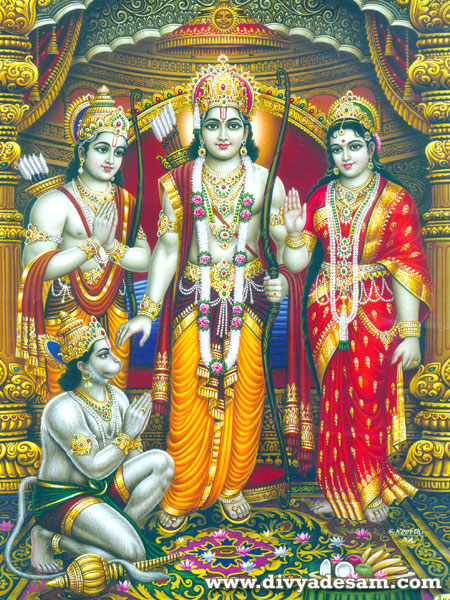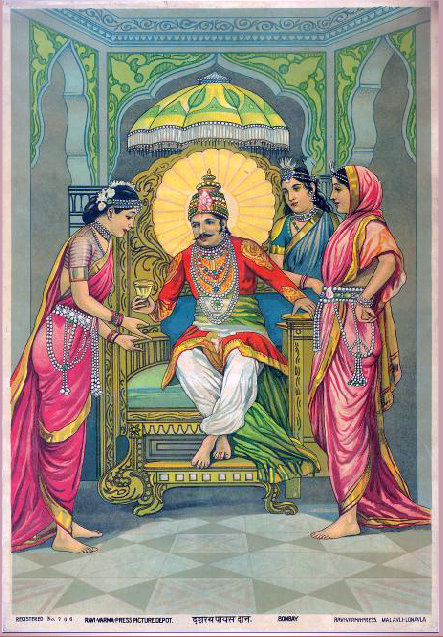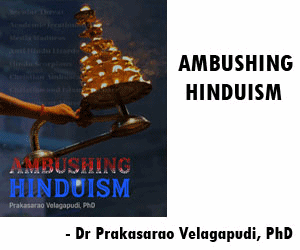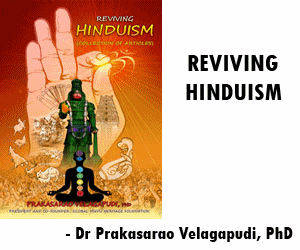Ramayana Timeless message for Human Understanding – Part 1
Revised version of the paper resented at 25th International Ramayana Conference, Mysore, India.
(Note: Part 2 will follow soon)
 "Rama, the ancient idol of the heroic ages, the embodiment of truth, of morality, the ideal son, the ideal husband, the ideal father, above all, the ideal king, this Rama has been presented before us by the great sage, Valmiki. No language can be purer, none chaster, none more beautiful and at the same time, simpler, than the language in which the great poet has depicted the life of Rama." - Swami Vivekananda.
"Rama, the ancient idol of the heroic ages, the embodiment of truth, of morality, the ideal son, the ideal husband, the ideal father, above all, the ideal king, this Rama has been presented before us by the great sage, Valmiki. No language can be purer, none chaster, none more beautiful and at the same time, simpler, than the language in which the great poet has depicted the life of Rama." - Swami Vivekananda.
“The work of Valmiki has been an agent of almost incalculable power in the moulding of the cultural mind of India: it has presented to it to be loved and imitated in figures like Rama and Sita, made so divinely and with such a revelation of reality as to become objects of enduring cult and worship, or like Hanuman, Lakshmana, Bharata the living human image of its ethical ideals; it has fashioned much of what is best and sweetest in the national character, and it has evoked and fixed in it those finer and exquisite yet firm soul-tones and that more delicate humanity of temperament which are a more valuable thing than the formal outsides of virtue and conduct.” Sri Aurobindo
Rama's principles alone make him victorious, as he does not deviate from the path of righteousness. And by not deviating from the path of righteousness, he is truly valorous, and the question of his defeat does not arise, because he will abide by his conscience.
In Hinduism, Rama is the ideal incarnation of the Divine. Though he is beyond all gunas, he reflects higher qualities such as compassion, gentleness, caring, sympathy, responsibility, purity, forgiveness, austerity, devotion (to his gurus and Lord Shiva), and courage in unlimited amounts. A considerable feature of Rama’s divine play was his extremely restrained use of divine powers. This allowed his beings to interact with and learn from him while treating him as a fellow being. Because of his unprecedented perfection in hiding his own divinity through his maya, recognizing his real nature was difficult for many of his unrealized contemporaries, including some of his “enemies.”
During Sri Rama's period, subject's wish was King's wish. Can we go back to that period where subjects wishes become the wishes of the ruler. Will we ever have the good fortune to live in such a nation! It depends on the will of the human race to demand and expect the qualities we find in Rama – such as sacrifice, tolerance, will power, devotion to Father, maturity, concern for the citizens, selflessness! Sri Rama, as the Ruler sacrificed everything for the welfare of His Subjects!
Universally regarded as one of the world's most important literary works, Ramayana has had a profound impact on the art, culture, family relations, gender, politics, nationalism and militancy in the Indian subcontinent. The everlasting value of this epic tale has been extolled through the centuries, and it has helped in molding the Hindu character largely. However, it would be wrong to say that Ramayana belongs only to the Hindus.
Ramayana is one of the greatest epic poems of the world and that, correctly understood, it leads us to understand the evolution of humanity:
The Ramayana shows us also, in the story of Rama and Sita, the ideal of human love, love which is inspired by the noblest of ideas. In India, it is difficult to find a Hindu family where the essence Ramayana has not been understood, where the divinity of Rama is not admired, extolled, and adored; where the chastity of Sita is not extolled and venerated; where the courage of Hanuman is not a subject of conversation, where the loyalty and faithfulness is not talked about, where Dasarath’s agony in sending his son Rama is not remembered. These heroes described in Ramayana are living personages provoking, kneading and tantalizing India’s thought, even in our modern times of upheavals and violence. It is they who would serve as our torch bearers to uphold dharma, who serve as role models for the humanity to follow, who preserve the glory of once Bharat in the India of today and whose ideals of truth and ahimsa could save the human race from it’s own destruction.
Every civilization has to remember the past. Violence, terror and brutality are the path to self destruction. Unless all these nations do not adopt the culture of the spirit, they may be doomed to perish in cruelty, brutality and blood.
The time has come for rethinking about the future of human race. It is time to follow the long-cherished ideals of Rama, Sita, Lakshman, Bharat, Hanuman and others who serve as best example of a magnificent, inspiring spiritual ideals exemplified by their behavior, suffering, and advise. If all the nations have to live in peace, accommodate the needs of their fellow human beings, allow the freedom of speech to reign across the globe, distance themselves from the destructive policies, then peace and truth exemplified in Ramayana have to be given a chance to work their way to preserve the human race. That means the establishment of Rama Rajya.
The question is “What is Rama rajya?”It is the reign of morality, truth, peace, and virtues. "Rama Rajya" means that which engenders happiness ("Ramayathi"). There should be no ill will towards anybody. Samanatva bhava is the main goal to treat people. No body lives in fear. No one should be harmed. That is Rama Rajya. When such feelings arise among the people Rama Rajya will come into existence of its own accord.
Bharat is in need of Rama Rajya. It has to practice the ideals of Rama Rajya, it has to take pride in it’s eternal, immortal values, it has spread these values from young to old, it has to advocate the value of these ideals, it has to convince other nations to adopt these ideals, and be a spiritual leader in mitigating the material supremacy.
When we speak of' establishing Rama Rajya, let not Bharatiyas imagine that it is relevant only to Bharat. The whole world needs the advent of Rama Rajya. What this means is that the rulers should have three qualities. They are righteous conduct (Sathpravarthana) good counsel (sadaalochana), good qualities (Sadguna).
Dharma
According to Aranya Kanda, "Wealth comes out of Dharma. Happiness comes out of Dharma. Everything is obtainable from Dharma. Dharma is the essence of this universe. The adept attains Dharma by disciplining themselves by the conditions of Dharma, with great effort; one cannot get happiness from happiness.". (9-30,31)
Dharma is eightfold as: "Sacrifice, Vedic study, Charity, Penance, Truth, Fortitude, Forgiveness, Non-desire."
Ten are characteristics of Dharma (Dharma Lakshanam) described in various scriptures: Fortitude, forgiveness, restraint, non-stealing, purity, control over sense organs, intelligence, knowledge, truth, absence of anger.
‘Dharma’ is a term which could be understood but which cannot properly be translated into any other language. This word comes from the root ‘DRI’ which means supporting. That which is the support of this universe is Dharma. The Brihadaranyaka Upanishad (1.4.14) says:
"Yet he did not flourish. He created that Dharma which has an excellent form. This Dharma is the controller of Kshatriya. Therefore, there is nothing higher than that. Even a weak man hopes to defeat a strong man by Dharma as one does through the king. Dharma is verily Satya or truth. A speaker of truth is said to speak Dharma or a person speaking Dharma is said to speak truth. Both these are but righteousness."
"He (Rama) is the type of a perfect husband, son, and brother. Sita also rises in character far above Helen and even above Penelope, both in her sublime devotion and loyalty to her husband, and her indomitable patience and endurance under suffering and temptation.....it may be affirmed generally that the whole tone of the Ramayana is certainly above that of the Iliad." (Monier Williams)
Dharma is used when Viswamitra takes the Lord to Mother Sita and the wedding takes place. “Hey Rama, I present my daughter to you. Sita is beautiful. She has a big dowry, she brings elephants, horses and jewellery with her. But the greatest dowry that she brings is her dharma.”
Bharata comes along with the army to request Rama to return to Ayodhya. He wants to occupy the throne which was deceptively denied it to Rama because of the two boons she had received from her husband Dasaratha. Lakshmana grossly miscalculates and says, “Sri Rama, our killer brother, Bharata, is coming. Please get your spears, lances, swords and shields ready.” The Lord said, “You don't need any protection with weapons when Bharata, the great master of non-violence and dharma, comes to you.”
Surpanaka came to meet Rama and wanted to marry him. First, she introduces herself the brother of Ravana. She mentions about the cruelty of his brother and describes his three children. She says that, “There is a third brother called Vibhishana who is a dharmatma, a righteous soul. How he came into our lives, I don't know. Every morning he prays to the Lord. He is totally different to us.”
1. King Dasharatha’s Advice to Sri Rama
 King Dasharatha summoned his son Rama on the eve of coronation and offered timely advice on the role of a king in the administration his nation and also tendered his advice on the code of behavior.
King Dasharatha summoned his son Rama on the eve of coronation and offered timely advice on the role of a king in the administration his nation and also tendered his advice on the code of behavior.
King Dasharatha said: "My son, although you are a storehouse of merits, I wish to offer some friendly advice to you out of sheer affection. Resorting to even greater humility (than before), constantly keep your senses under control. Avoid vices born of lust and anger."
What are these vices he is talking about? Many scriptures enumerated these as hunting, playing at dice, sleeping by day, slandering others, fondness for women, vanity, violence, vindictiveness, jealousy, fault-finding, squandering one’s wealth, abusive speech, and cruelty in punishment.
Rule according to both the direct and indirect methods of governance
Indirect method:
1) Ascertaining the conditions and loyalty of one’s own people and the relative strength and intentions etc., of the neighboring states through a network of spies.
Direct Method:
2) To make a tour of one’s dominions and ascertain things personally, to invite direct petitions from one’s subjects, hear their grievances and decide their cases on their own merits.
"Please your ministers and others (namely, the Army Commanders and Civic Guards) as well as people responsible for maintenance (against future contingencies) of numerous stores (of useful materials such as jewelry, gold and silver, textiles and ornaments) along with barns and armouries."
"The friends and allies of a King, who protects the earth with fostering care and whose subjects are not only loved by him as his children but are devoted to him in their turn, exult in the same way as the immortals did on securing nectar. Therefore, disciplining your mind, my son, conduct yourself well as instructed by me."
The importance attached to personal discipline and far-sightedness in matters of efficient administration will be evident from the foregoing.
Who is Dasaradha?
Dasaratha literally means the human body which has got five working organs and five sensory organs. Dasaratha symbolises this charioteer of the human body which has got ten organs. Dasaratha also attracted three Gunas (qualities) in the form of Kausalya, Sumitra and Kaikeyi. The four Purusharthas viz., Dharma, Artha, Kama and Moksha are symbolised by Dasaratha’s four sons. Dasaratha was one who proclaimed such a significant inner meaning to the world and he urged the people to lead an ideal life.
Dasaratha and Rama were always in touch with People
Among the invaluable leadership lessons that Valmiki Ramayana gives us is about the need for a ruler/leader to be in touch with his people. When Dasharatha asks the citizens of Ayodhya why they wanted his son Rama to be crowned crown prince, among the numerous reasons he gives is the fact that he was constantly in touch with the common man. The only time he was not in touch with people on the streets on an everyday basis was when he was away at a war. But as soon as he was back, he again began meeting every day the people whose prince he was and enquiring about their welfare.
Samgramātpunarāgamyakunjareṇarathenavā
Paurānsvajanavat nityam kuśalampariprchhati;
Putreṣuagniṣudāreṣupreṣyaśiṣyagaṇeṣu ca
Nikhilenaanupurvyāccapitāputrānivaaurasān.
“After coming back from the war, he used to move among the people on an elephant or by chariot every day. He would then ask of their welfare as though they were members of his own family. He would enquire about their children, about the sacrificial fires they kept, about their wives, about their servants and disciples. He would enquire about them in detail, as a father enquires of his sons.”
The Ramayana also speaks of Rama’s constant touch with people whose ruler he was in many other places and ways. It says he used ask the brahmanas about how well their disciples served them and the kshatriyas about how fit and ready their soldiers were. And every time there was a festivity in a common man’s home, he used to feel the man’s joy as a father would his son’s and when a misfortune befell any man, such was his empathy that he felt it as though it was his own sorrow.
Rama’s Concern for all
Rama's concern for everyone, on the other hand, was touching as can be seen from the instance when He chided Sugriva for his daring act of knocking down Ravana's diadem from his head in anger when he sighted him. Rama cautioned him, "Never repeat such an act any more. Had anything happened to you, I would have had nothing to do with Sita, Bharata, Lakshmana and Satrughna or even with My own person." Commentators highlight that one who had befriended Him just a few months ago mattered more to Rama than even His consort.
Dharma should be practiced and protected
When mother Kaushalya and also the citizens of Ayodhya plead with Rama not go to the forest, Rama replies that Dharma lies in obeying the words of the father and that he, being devoted to Dharma, cannot transgress the words of his father.
At this stage Rama’s Dharma is to perform his duty as a son. After returning from the forest, upon being crowned as King, Rama’s Dharma as a king takes precedence over his own self or over his family. The interest of the kingdom or the nation is above that of the individual or the family of the individual (now crowned as king.) In the interest of the kingdom, Rama would sacrifice his own life; would sacrifice his family life (banish his wife Sita).
Rama says: "I can renounce my life, Lakshmana, and you, Sita, but I cannot break my promise.” In every man’s heart should ring today the grand and most memorable declaration of Rama:
“The fire may abandon its heat, ice its coolness, jasmine its fragrance, but I never break the promise made to my father.”
Rama’s own mother, Queen Kaushalya, tries her utmost to dissuade him. She tells him how the mother is even greater than the father for has it not been said, first and foremost: “Matru Devo Bhava” – let thy mother be like a God unto thee. But no, truth is indeed the supreme God of all gods.
Who is Rama?
Sage Valmiki, with genuine interest and eagerness enquired of Sage Narada, who travels to all loaks, "Who, now living in this world, is the embodiment of virtuous qualities, the one with valour, knowing fully well the tenets of Dharma(Righteousness), possessing the sense of gratitude, uttering truth, adhering to vows firmly, distinct for leading a blameless life, kindly disposed to all living beings, very learned, achieving all tasks, having sweet personal appearance, possessing tremendous strength of mind, conquering anger, radiant, not envious towards others and whom, when engaged in a ferocious battle, even gods tremble to face." Sage Narada admitted that it be difficult to find anybody who possess 16 qualities in this world; but he hesitantly revealed that Rama of Ikshuvaka dynasty is the only one who adorns all these qualitied. Rama is a rare avatara where he never claimed to a God incarnation although recognize him to be.
 He has been described as ideal son, ideal brother, ideal husband, ideal enemy, and ideal king because of his respect for dharma. He never disobeyed his father. He did not want to live disobeying his parents. He said, “Obedience unto his parents is the virtue of a son. Disobeying the command of my father I am not eager to live…. Truth, almsgiving, honor, and sacrifices with profuse gifts are not so strengthening as the services rendered unto the parents. Health, wealth, grains, learning, son, and happiness, --- nothing remains inaccessible unto us …. Therefore, I desire to follow what my father commends me, treading the path of the path of truth, --- this is the virtual eternal.” (P. 278, Araynakandam)
He has been described as ideal son, ideal brother, ideal husband, ideal enemy, and ideal king because of his respect for dharma. He never disobeyed his father. He did not want to live disobeying his parents. He said, “Obedience unto his parents is the virtue of a son. Disobeying the command of my father I am not eager to live…. Truth, almsgiving, honor, and sacrifices with profuse gifts are not so strengthening as the services rendered unto the parents. Health, wealth, grains, learning, son, and happiness, --- nothing remains inaccessible unto us …. Therefore, I desire to follow what my father commends me, treading the path of the path of truth, --- this is the virtual eternal.” (P. 278, Araynakandam)
Rama and Sita were close and know each other’s heart. They never considered themselves as independent of each other. When Rama and Lakshmana were preparing to the exile, Sita wanted to go with him like shadow in spite of the forest dangers and arduous life. Rama said that there are many evils in the forest, roaring lions live in the forest, wind is full of misery, animals with all their madness approach to attack, wayfares are covered with thorns and creepers, rivers are infested with crocodiles and sharks, paths are covered with reptiles and other kind of poisonous animals, and many unexpected dangers await. As an ideal husband he described in great details potential dangers in the forest dwellings. None of these dangers dissuaded Sita.
Lakshmana was to protect Sita when Rama went in search of Golden deer. As he did not return for a long time, Sita coerces Lakshman to go in search of Rama. Lakshman reluctantly agrees with a condition that she should not cross the protective line he draws. Reluctantly she crossed the line not knowing the trick played by Ravana, who then kidnapped her to Lanka. Rama and Lakshman retuned to find Sita, not finding her Rama fainted. After recovered he stated, aid Rama: "Sita is my heart's love. I cannot live without her. For my sake she deserted the royal palace to wander in this fearsome jungle. Now that she is gone, the moments seem longer than years. . . . How can I live on when she is lost to me?" We can decipher how he feels so close to Sita.
After Ravana kicked Vibhishan out of the country, Vibhishana proceeded to meet Sri Rama. He was pleased thinking that now onwards he would get a chance to live with Sri Rama. When the monkeys saw him coming, they thought that some spy of the enemy had come. They stopped him at the main gate and went inside to inform Sugreev and Sri Rama about his arrival.
 Sri Rama asked Sugreev about his opinion. Sugreev had apprehensions in his mind regarding the real motives of Vibhishan. He said, "I am not so sure why he has come. I think it would be appropriate for us to bind him up."
Sri Rama asked Sugreev about his opinion. Sugreev had apprehensions in his mind regarding the real motives of Vibhishan. He said, "I am not so sure why he has come. I think it would be appropriate for us to bind him up."
Sri Rama said-"Though your policy is appropriate, yet my vow is to protect such people who have taken my refuge." When Hanuman came to know about Sri Rama's decision, he was very pleased. Sri Rama said-"Even if a sinner who has committed the gravest sin of killing crores of Brahmins, seeks my refuge, I will never abandon him. Even if he has been sent by Ravan to know our secrets, it does not matter because Laxmana is capable of annihilating all the demons within seconds."
After Ravana was killed, the duty to perform the final rites fell on the shoulders of surviving brother Vibhishana who hesitated to perform his brother’s funeral rites because of Ravana’s evil deeds. On this occasion, Rama made a very powerful and profound statement for the human race to follow: "Ravana fought like a true warrior and fell fighting like a hero! Death has washed his sins. Ravana has entered heaven. It is for you now, his brother, to do the rites. I, his former foe, even I can rightly perform his obsequies. Your brother is my brother too, is he not?" His benevolence, forgiveness and respect for dharma are unrivaled knowing that Ravana abducted his beloved wife.
Please subscribe to Save Temples Telegram channel at https://t.me/savetemples











 Urgent support needed for Bangladesh Hindus
Urgent support needed for Bangladesh Hindus 







